تتبع المساعدات النقدية والقسائم
لتزم الموقعون على الصفقة الكبرى بزيادة استخدام المساعدات النقدية والقسائم، واستخدام علامات مشتركة لقياس هذه الزيادات. على الرغم من بدء تتبع حجم المساعدات النقدية والقسائم بشكل أكثر فعالية، إلّا أنه ثمة تحديات تقنية وسياسية. وهذا يضم ما يلي:
- تحديد البيانات التي يجب جمعها وطريقة القيام بذلك
- ضمان الالتزام باستخدام فئات وأنظمة البيانات
- معالجة أوجه القصور في أنظمة إعداد التقارير الحالية التي لم يتم تصميمها في كثير من الأحيان لتضمين أو تفصيل النقد والقسائم والطرائق الأخرى
- التوصل إلى اتفاق مشترك حول الفئات المعيارية للإبلاغ لتجنب البيانات غير الكاملة وغير المتسقة.
الأولويات الحالية
شاركت شبكة CALP، من عام 2017 إلى عام 2019، في قيادة مسار العمل الفرعي للصفقة الكبرى بشأن تتبع المساعدات النقدية والقسائم مع المديرية العامة للحماية المدنية الأوروبية وعمليات المساعدة الإنسانية، بهدف رئيسي يتمثل في الاتفاق على الحد الأدنى من المتطلبات لتتبع المساعدات النقدية والقسائم. يتضمن ذلك دمج المساعدات النقدية والقسائم في أنظمة ومنصات إعداد التقارير الرئيسية المشتركة بين الوكالات، أي خدمة التتبع المالي التابعة لمكتب تنسيق الشؤون الإنسانية ووحدة مشروع دورة البرمجة الإنسانية، ومعيار بيانات مبادرة الشفافية الخاصة بالمعونة الدولية، وإعداد تقارير 3W (وهي تتمثل في من الذي سيفعل وماذا سيفعل وأين سيفعل). تم الآن دمج مسار العمل الفرعي الخاص بتتبع المساعدات النقدية والقسائم في مسار العمل الفرعي للكفاءة والفعالية والقيمة مقابل المال، والذي ستستمر شبكة CALP في قيادته.
Featured content

Tracking Cash & Voucher Assistance Workshop – Part 2: Report
Presentation
Do you want to read the latest on discussions on how to best track cash and voucher assistance in global interagency reporting systems? The CALP Network and ECHO have just released Tracking Cash & Voucher Assistance Workshop – Part 2: Report. Key recommendations emerging from the workshop are summarized below. These will be used in the coming months as a basis to develop guidance for...

Measuring Cash Transfer Programming – Scoping study
Report
This scoping study explores technical and policy issues that are constraining progress towards better measurement and reporting of Cash Transfer Programming (CTP) and addresses these to identify ways forward. The study was developed with the following objectives: • Map and document how different implementing agencies and donors are measuring cash and voucher programming data at the...

Tracking Cash and Voucher Assistance: Agreements, recommendations and minimum requirements from the Grand Bargain cash workstream
Guidelines and Tools
This document comprises the key outputs of the work undertaken through the Tracking Cash and Voucher Assistance (CVA) Working Group from 2017 to 2019. The Tracking CVA Working Group was established as the
platform for engagement and decision-making for the sub-workstream on Tracking CVA, which is part of the Grand Bargain Cash Workstream. The Tracking CVA sub-workstream was co-led by the the...
Thematic lead
Latest
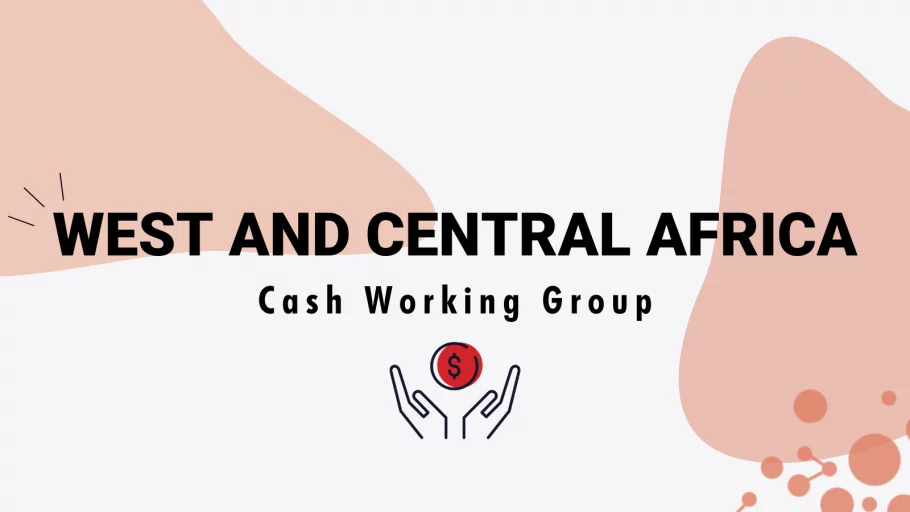
Regional Cash Working Group – WCAF
Event
This is a Save the Date for the next Regional Cash Working Group meeting that will take place on Wednesday March 06TH, 2024 from 9am to 11am (GMT) face to face and on line The meeting will have simultaneous interpretation in English and French. The agenda for this meeting will be: National CWGs round...

Minutes and presentations from the WCAF regional CWG
Meeting minutes
Minutes and presentations from the WCAF regional CWG – 6 March 2024 Watch the recording here or on YouTube:

مؤشرات للتخفيف من مخاطر العنف القائم على النوع الاجتماعي لدى تقديم المساعدات النقدية
إرشادات وأدوات
يقدّم هذا الدليل مؤشرات بديلة لتقييم مخاطر العنف القائم على النوع الاجتماعي على النساء في تدخلات النقد. يمكن أن تعمد الجهات الفاعلة في مجال المساعدة النقدية إلى تكييف...
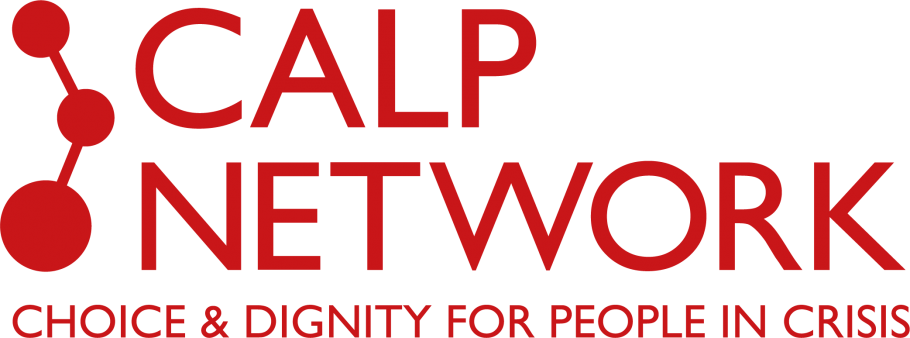
CALP Board Meeting
Members event
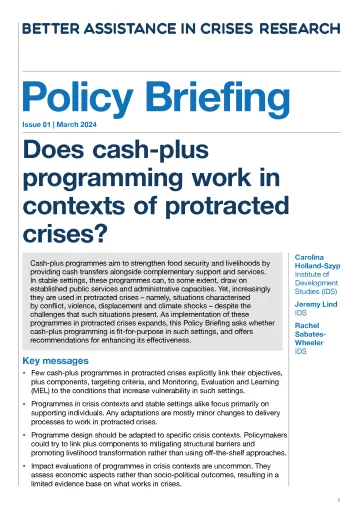
Does Cash-Plus Programming Work in Contexts of Protracted Crises?
Policy paper
Cash-plus programmes aim to strengthen food security and livelihoods by providing cash transfers alongside complementary support and services. In stable settings, these programmes can, to some extent, draw on established public services and administrative capacities. Yet, increasingly they are used in...

NGO Policy Dialogue Roundtable
Members event
ICVA and CALP would like to invite NGOs to a one-hour roundtable discussion for NGOs on 29th February at 9am UTC as part of a BHA and CALP convened CVA Policy Dialogue process. Please register here.
As part of the process, constituency roundtables have been organized e.g., among local organizations,...

South Sudan Joint Markets Monitoring Initiative (JMMI) Workshop
Members event
South Sudan Cash Working Group in collaboration with REACH and the CALP Network East and Southern Africa Regional Office wishes to extend an invitation to all CWG Members collecting JMMI data for the JMMI Workshop on Enhancing Market Monitoring in South Sudan. The virtual workshop is scheduled for...

Exploring linkages between Cash and Voucher Assistance and Social Protection in West and Central Africa
Webinar recording
This is the first in a series of webinars that aims to explore the connections between humanitarian CVA and social protection in West and Central Africa region. The webinar sought to frame the discussion with opening remarks from Dr. Sintike Tarfa Ugbe, Director of Humanitarian & Social Affairs of the...
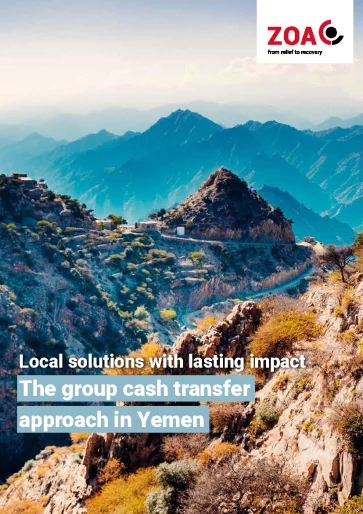
The Group Cash Transfer Approach in Yemen
Case Study
The GCT approach was contextualized and piloted successfully in both North and South Yemen by ZOA Yemen and its local partner SDF in 2022 and 2023. More than 100 community groups submitted their plans and received cash transfers to implement their proposed activities. Cash transfers ranged from 2,000 USD...

Linking Social Protection and Humanitarian CVA
Training
Please note that this is a 2-day face-to-face training, which will be delivered on 26th to 27th February 2024 in Dushanbe, Tajikistan. This event will be delivered in English with translation to Russian.

Locally Led Anticipatory Action Guide and Toolkit
Guidelines and Tools
How civil society organisations can engage with communities, and collaborate with mandated, technical and donor agencies to localise and scale up early warning and early action
The purpose of the guide is to support civil society organisations to engage with communities and other actors and structures...

Data Responsibility Working Group (DRWG) Task Team on Cash
Members event
Promotes and tracks implementation of the IASC's Data Responsibility Guidance

CALP TAG (Technical Advisory Group) Meeting
Members event
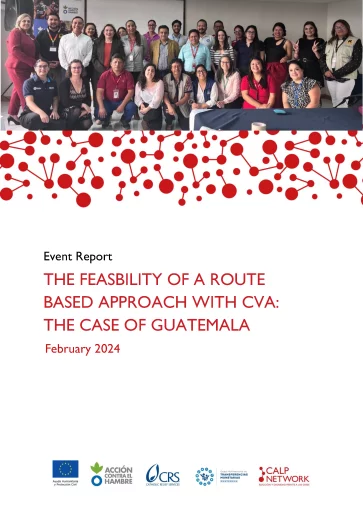
Event Report: The feasibility of a route-based approach with CVA: The case of Guatemala
Meeting minutes
In 2022, CALP recognized the importance of human mobility and CVA and invited its network to contribute to the evidence and debate. CALP conducted the study People are on the move: Can the world of CVA keep up? Analysis of the use of CVA in the context of human mobility in the Americas examined the use of...
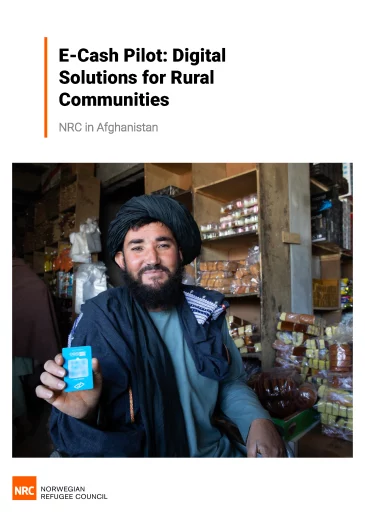
E-Cash Pilot: Digital Solutions for Rural Communities
Report
An innovative digital cash project piloted by the Norwegian Refugee Council (NRC) in the Maiwand district of Kandahar province has successfully demonstrated a new and more secure way of providing humanitarian assistance while significantly enhancing the inclusion and resilience of rural...

Pathways Toward a Green Humanitarian Response
Report
The humanitarian sector is grappling with the task of reducing its negative impacts upon the climate and environment. Despite growing awareness of the need to shift towards greener action, tangible change and outcomes have remained frustratingly limited, while the impacts of climate and environmental...
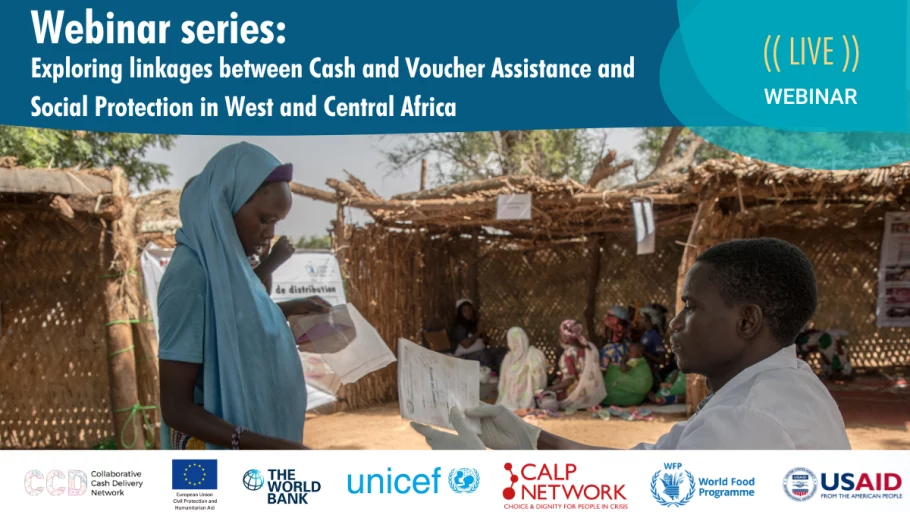
Webinar series: Exploring linkages between Cash and Voucher Assistance and Social Protection in West and Central Africa
Webinar
There was a lot of buzz on the need to link humanitarian assistance to social protection (SP) systems, especially during the COVID pandemic. The linkage should encompass various contexts from stable well-organised states, preferred context by development and social protection stakeholders, to conflict...

Addressing Negative Socioeconomic Impacts of the COVID-19 Pandemic through Social Protection in Viet Nam – Supporting incomes and livelihoods with cash assistance in Dong Nai province
Case Study
In late April 2021, Viet Nam faced its fourth wave of COVID-19, with over 895 000 new cases reported. COVID-19 and related restrictions hindered livelihood options and vulnerable households faced financial stress to cover basic needs. Some of them lost their income and were unable to return to home...

Special session: Payments group, RedRose
Members event
This special session of the Payment Solution Seekers roundtable group is part of a series of events that seeks to increase the surface area between private sector payment companies and Cash and Voucher Assistance (CVA) implementing organisations.
This event gives implementing organisations a chance to...
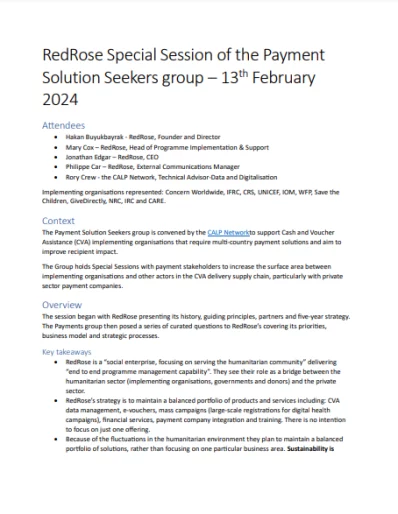
RedRose presentation to Payments group – Notes, 13th February 2024
Meeting minutes
These meeting notes give details to the Special Session held with RedRose on 13th February 2024, hosted by the Payments group.
The session began with RedRose presenting on its history, guiding principles, partners and five-year strategy. The group then posed a series of curated questions to understand...



